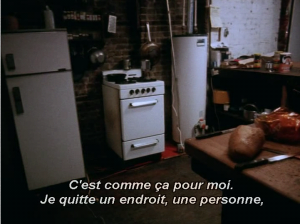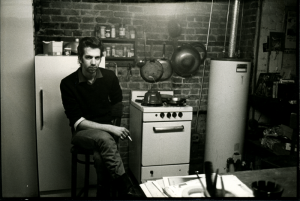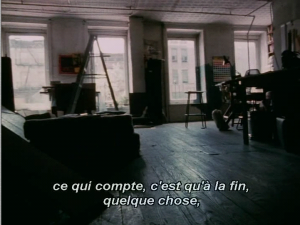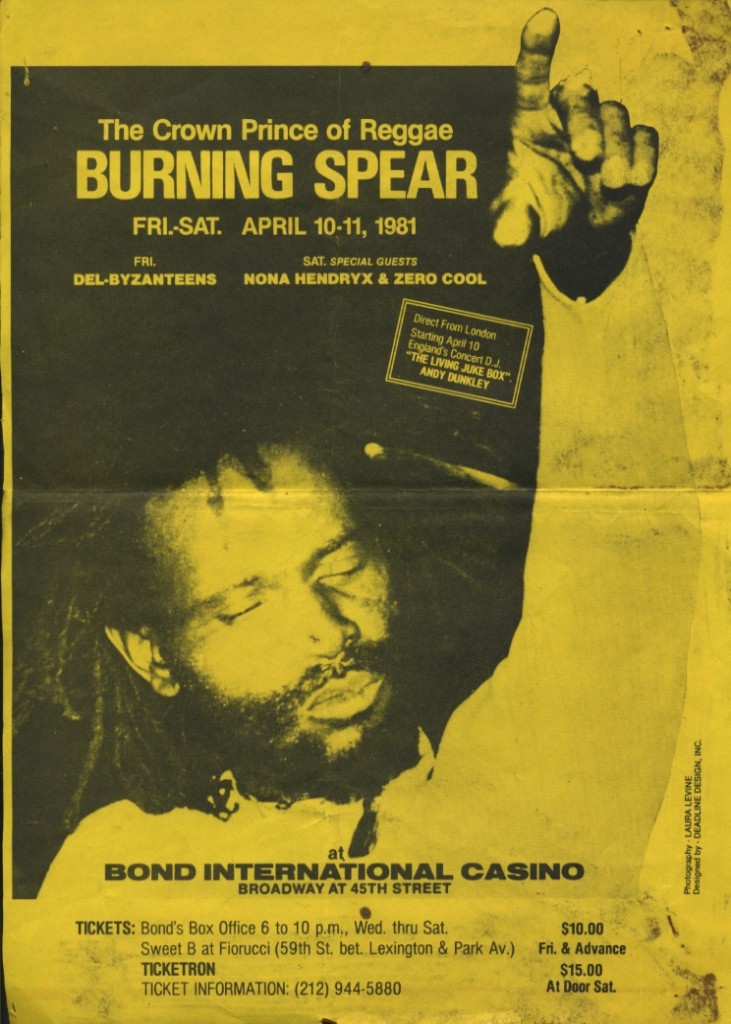Archives par mot-clé : permanent vacation
Compound Interests
IT’S ONE AM on a Friday night at Bond’s International Casino In Times Square.
The crowd is a wildly heterogeneous mix, but they all look out of place in this enormous Martian version of Caesar’s Palace.
Terse jokes and beer bottles are going sideways around the room and the Del-Byzanteens hit the stage.
The first number is a slight blur, the instruments awash in a vast sea of undistilled sound. But things slowly crystallize and one after another the voices and instruments take on their own distinctive shapes.
The first to emerge clearly is James Nares, drummer, who plays an eclectic stand-up kit built around timbales. He’s playing fills, furls and rimshots in a highly decorative Latino style with the assured grace of someone who’s been a semi-professional drummer for much longer than four months. And four months is what it is, even if he has been rattling skins on whims in garages for years. And he’s also an accomplished guitarist, having served his time in everybody’s downtown ur-group, the Contortions.
His name on the street, however, is mostly based on his films. After collaborating with John Lurie on Men In Orbit and Hell Is You, he made the wildly acclaimed Rome 78, a rollicking pseudo epic that let various local gargoyles be themselves within sword-and-sandal conventions.
He then shifted gears with a serious video portrait of an IRA member, called No Japs At My Funeral after Lord Mountbatten’s famous fishing accident. He’s starting work on a major feature sometime in the fall.
The next resonance to detach itself from the general throb is that of Philippe Hagen’s bass, insisting a line around and against Nare’s broken fieldwork. Hagen, besides everything else, simply looks like a bass player. He’s got that skinny, stalking quality that makes for maximum symbiosis between man and long-necked guitar.
This is his third band and by now he’s checking out the frontiers of the instrument, getting down mathematically. Besides rehearsing with an as-yet veiled sideline band, he continues his work as a visual artist, doing most of the band’s posters and continuing his political street warfare with a succession of brilliant, anonymous posters that are rapidly torn down by both « collectors » and « angry citizens ».
Those oddly-shaped high-pitched coils of synthetic tone are emanating from Jim Jarmusch’s fingertips, maneuvering around two sets of keyboards. A tiny, weightless organ sits atop an older synthesizer, and Jarmusch is salting with one and bashing with the other, barely moving, concentrated.
Like Nares he is best known as a film maker. With a very successful first picture, Permanent Vacation, behind him—as well as a series of shorts—he is gearing his production company Cinesthesia for a September shooting of something called The Garden of Divorce. His films are moody, atmospheric, often unexpectedly funny, and tend to be about people set adrift in urban jungles.
When Phil Kline’s angular lead guitar is added, the Del-Byzanteens have resumed their rightful shape. Kline effortlessly plays anything a lead guitar can assume: lyrical, keening, bell-like, but most often understated and economical. This bespeaks years of experience on the notorious Ohio bar circuit, although accounting for only half his roots.
Kline is a remarkable if undiscovered composer of non-pop music. He has scored numerous films, most recently Sara Driver’s You Are Not I and works with a huge variety of elements to produce unclassifiable and totally accessible modern music that stands apart from the contemporary « serious music » slough.
So you get the idea that the Del-Byzanteens are not so much a unit as a set of intersections, and if the Del-Byzanteen intersection is a thriving thoroughfare, the feeder roads are highways of their own accord. No chance of gridlock here.
Luc Sante
in Central Intelligence



